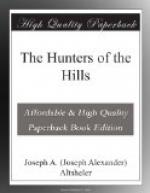“It can’t be the band we beat off when we were in the hollow,” said Willet confidently. “They must be far south of us, even if they haven’t given up the chase.”
“It is so, Great Bear,” said Tayoga. “Was the warrior’s head bare, Lennox, or did he have the headdress, gustoweh, like mine?”
“I think,” replied Robert, “that the feather projected something like yours, perhaps from a cross-splint.”
“Could you tell from what bird the feather came?”
“Yes, I saw that much. It was the plume of an eagle.”
Tayoga mused a moment or two. Then he put two fingers to his mouth and blew between them a mellow, peculiar whistle, much like the notes of a deep-throated forest bird. He waited half a minute and a reply exactly similar came.
“These,” said Tayoga, “are our people,” and rising and parting the bushes, he walked, upright and fearless, toward the thicket in which Robert had seen the warrior. Robert and Willet, influenced by boldness as people always are, followed him with confidence, their rifles not thrust forward, but lying in the hollows of their arms.
A dozen warriors issued from the thicket, at their head a tall man of middle age, open and noble in countenance and dignified in bearing.
“These be Mohawks, Ganeagaono, the Keepers of the Eastern Gate,” said Tayoga, “and the sachem Dayohogo, which in English means, At the Forks, leads them. He is a great man, valiant in battle and wise in council. His words have great weight when the fifty sachems meet in the vale of Onondaga to decide the questions of life and death.”
He paused and bent his head respectfully before the man of superior age, and, as yet, of superior rank. A look of pleasure appeared upon the face of the Mohawk chief when he saw the young Onondaga.
“It is Tayoga of the clan of the Bear, of the nation Onundagaono (Onondaga),” he said.
“It is so, Dayohogo of the clan of the Wolf, of the nation Ganeagaono (Mohawk),” replied Tayoga. “Thou of the Keepers of the Eastern Gate and my father, Daatgadose, of the Keepers of the Council Fire, have been friends since they stood at the knees of their mothers, and we too are friends, Dayohogo.”
“You speak true words, Tayoga,” said the chief, looking with an appraising eye upon the handsome face and athletic figure of the young Onondaga. “And the white people with you? One I know to be the Great Bear who calls himself Willet, but the boy I know not.”
“His name is Lennox, O Dayohogo. He is the true friend of the Great Bear, of Tayoga and of the Hodenosaunee. He has within the last two days, standing beside us, fought a valiant battle against the Abenakis, the Hurons, the St. Regis and warriors of the other savage tribes that call themselves the allies of Onontio.”
Robert felt the penetrating eye of the Mohawk chief upon him. But the gaze of the Indian was friendly, and while he felt admiration for Tayoga he felt equal approval of Lennox.




